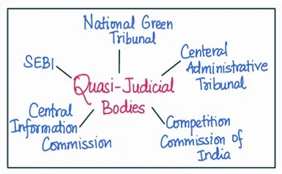Answer:
| Approach:
Introduction
- Introduce the concept of quasi-judicial bodies as administrative or non-judicial organizations that have the authority to make decisions, adjudicate disputes, or impose penalties in specific matters, functioning within specialized areas of law.
Body
- You can also mention in brief, Articles 323A and 323B of the Constitution.
- Explain the characteristics of quasi-judicial bodies and their role in complementing the traditional judicial system.
- Provide concrete examples of quasi-judicial bodies in India, such as:
- Central Administrative Tribunal (CAT),
- National Green Tribunal (NGT),
- Competition Commission of India (CCI), and
- Telecom Disputes Settlement and Appellate Tribunal (TDSAT).
- Discuss their respective areas of expertise, functions, and powers, highlighting their importance in providing efficient and focused dispute resolution or decision-making mechanisms.
Conclusion
- Write a relevant conclusion.
|
Introduction:
Quasi-judicial bodies are administrative or non-judicial entities that possess the authority to adjudicate disputes, make decisions, and impose penalties in specific areas. Although not part of the traditional judicial system, they exercise powers akin to courts, thereby providing a more efficient and focused mechanism for dispute resolution. Articles 323A and 323B of the Constitution empower the establishment of such bodies.
Body:
Constitutional provisions related to Quasi-judicial bodies:
- Article 323A enables the creation of administrative tribunals to handle disputes related to public services,
- While Article 323B allows both Parliament and State Legislatures to set up tribunals for various areas such as taxation, land reforms, and industrial disputes.
- These entities offer a specialized dispute resolution system, supplementing the traditional judiciary.
Some concrete examples of quasi-judicial bodies in India are:
- Central Administrative Tribunal (CAT):
- CAT is a specialized tribunal established under the Administrative Tribunals Act, 1985, to adjudicate disputes related to recruitment and service conditions of public servants.
- It was created to provide speedy and effective redressal for grievances of government employees, thereby reducing the burden on traditional courts.
- National Green Tribunal (NGT):
- Established under the National Green Tribunal Act, 2010, NGT is a specialized body that deals with environmental disputes involving the enforcement of legal rights related to the environment, pollution control, and conservation of natural resources.
- The NGT is empowered to hear civil cases involving substantial questions related to the environment and impose penalties on violators.

- Competition Commission of India (CCI):
- The CCI is a statutory body set up under the Competition Act, 2002, to prevent practices that have an adverse effect on competition, promote and sustain competition, protect consumer interests, and ensure freedom of trade.
- The CCI has the authority to investigate anti-competitive practices, impose penalties, and issue orders to regulate market competition.
- Telecom Disputes Settlement and Appellate Tribunal (TDSAT):
- Established under the Telecom Regulatory Authority of India (TRAI) Act, 1997, TDSAT is a specialized tribunal that adjudicates disputes and hears appeals related to the telecommunications sector.
- It deals with cases involving telecom service providers, broadcasting companies, and cable operators, ensuring a focused mechanism for dispute resolution in this rapidly evolving industry.
Conclusion:
These bodies are essential for providing efficient, specialized, and focused dispute resolution or decision-making mechanisms, complementing the traditional judicial system in addressing the complexities of modern society.
